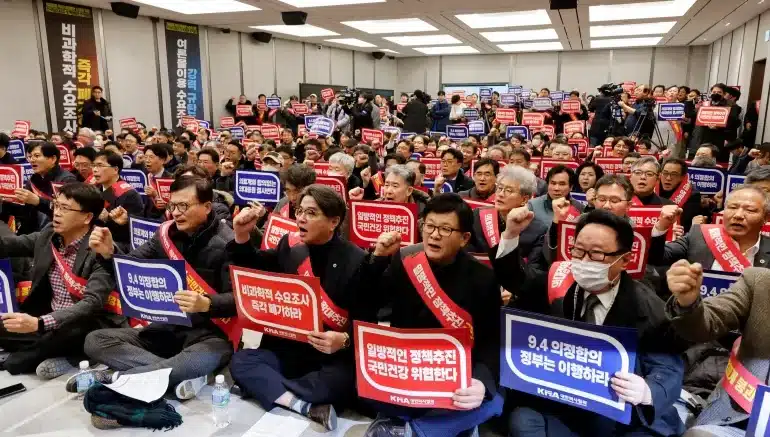The tension between South Korea’s government and thousands of trainee doctors who initiated a widespread walkout in opposition to healthcare reforms has intensified, with the doctors refusing to return to their duties despite a government ultimatum threatening legal action.
As the government deadline approached on Thursday, Yonhap News Agency reported that the majority of the protesting young doctors, who oppose the government’s efforts to increase medical school admissions, exhibited little inclination to resume their hospital duties.
Vice Health Minister Park Min-soo expressed relief that a mere 294 out of over 9,000 trainee doctors had returned to work by Wednesday night, commending their decision as wise. He indicated efforts to engage in dialogue with the striking doctors, expressing uncertainty about the turnout for scheduled talks on Thursday. Park emphasized the importance of prioritizing patient care and urged the doctors to reconsider their approach to protesting.
While the Korean Medical Association (KMA) has denounced the government’s perceived intimidation tactics, it has not publicly addressed the possibility of negotiations. However, a social media account affiliated with young doctors dismissed the government’s overture with a skeptical response.
The government plans to initiate punitive measures starting March 4, notifying doctors who remain absent of impending license suspensions and providing them with an opportunity to respond. According to South Korean law, doctors who defy government orders to return to work face potential suspension of their medical licenses for up to a year, along with fines or even imprisonment.
Observers speculate that authorities may focus punitive actions on strike leaders to avoid exacerbating disruptions in hospital operations.
At the heart of the dispute lies the government’s proposal to increase medical school admissions by 2,000 students annually, aiming to address the challenges posed by the country’s aging population. Critics argue that universities lack the capacity to provide quality education to such a large influx of students and emphasize the need to address existing concerns regarding pay and working conditions before expanding the physician workforce.
The walkout has caused significant disruptions in major hospitals, leading to patient rejections and the cancellation of medical procedures. Advocacy groups representing patients with severe illnesses have urged doctors to return to work to facilitate discussions aimed at improving the healthcare system.
Despite public support for the government’s reform efforts and a rise in approval ratings for President Yoon Suk-yeol, analysts predict a prolonged standoff between the government and doctors as both sides remain steadfast in their positions.

